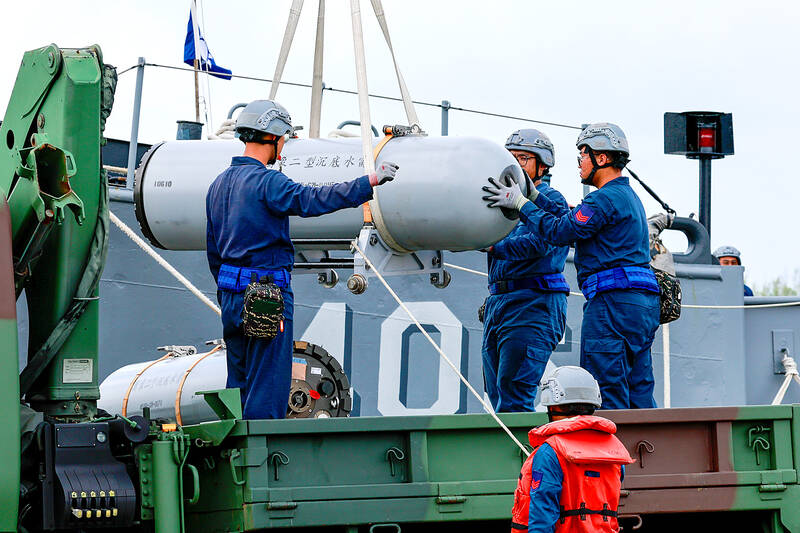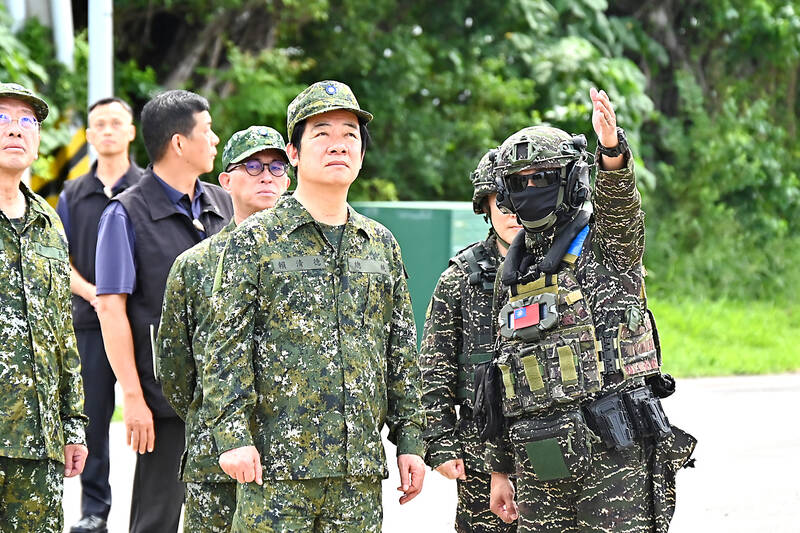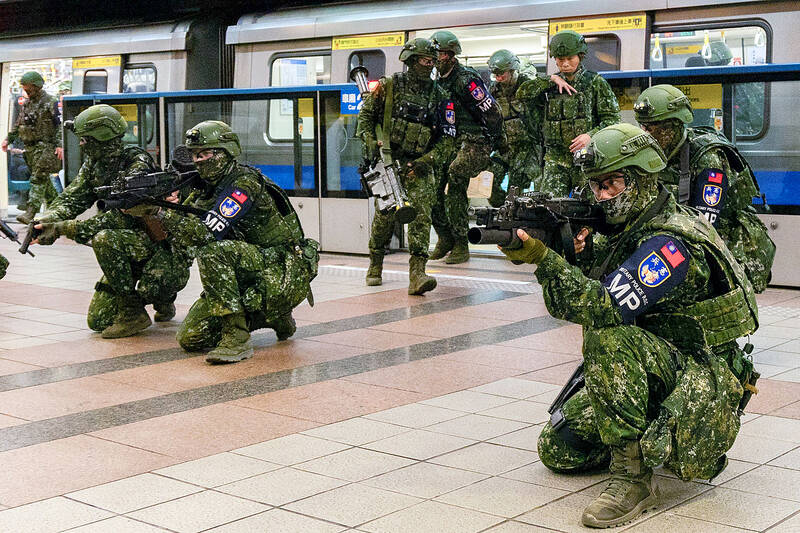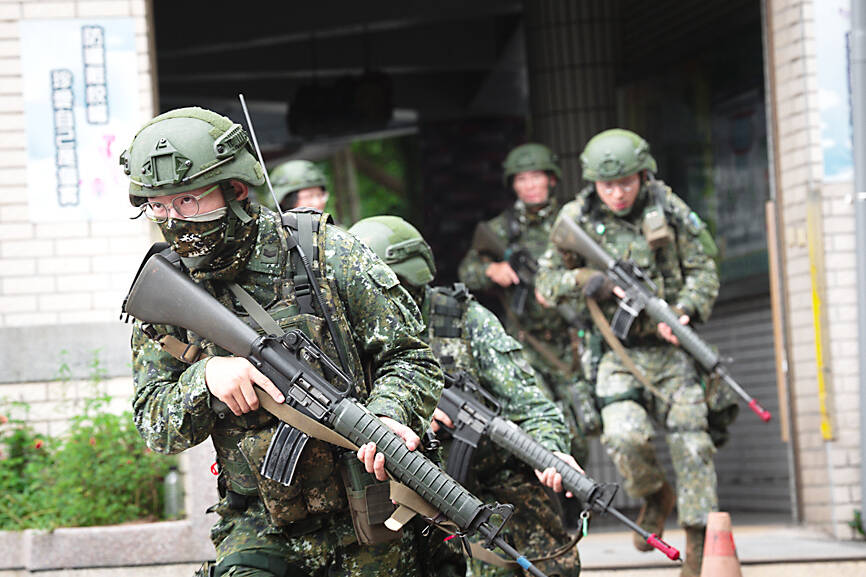The ongoing Han Kuang military exercises entered their sixth day yesterday, simulating repelling enemy landings in Penghu County, setting up fortifications in Tainan, laying mines in waters in Kaohsiung and conducting urban combat drills in Taipei.
At 5am in Penghu — part of the exercise’s first combat zone — participating units responded to a simulated rapid enemy landing on beaches, combining infantry as well as armored personnel.
First Combat Zone Commander Chen Chun-yuan (陳俊源) led the combined armed troops utilizing a variety of weapons systems.

Photo: EPA
Wang Keng-sheng (王鏗勝), the commander in charge of the Penghu Defense Command’s mechanized battalion, said he would give the exercise a score of “100 percent.”
Since taking leadership of the unit in May, Wang said he has followed the principle of “one day without war, one day without feeling at ease,” ensuring that participating personnel are sure of their roles.
In Tainan, the army’s 54th Engineer Group conducted a nighttime exercise in constructing defensive fortifications to block a potential enemy advance.

Photo: Lee Hui-chou, Taipei Times
The unit deployed “Czech hedgehogs,” moved abandoned vehicles into the roadway and installed razor wire barricades, among other measures, to make it difficult for enemy personnel and vehicles to pass.
Some drivers who passed by the area while soldiers set up the fortifications shouted words of encouragement.
It is important to test how quickly fortifications could be erected in a low-light environment, personnel said.

Photo: AFP
The site was cleared by 5am, they added.
In Kaohsiung’s Zuoying District (左營), President William Lai (賴清德) observed a mine-laying exercise and provided personnel with extra meal money to encourage them and show appreciation for their work.
Chang Chia-ming (張家銘), from the navy’s 192nd Fleet’s mine operations squadron, told the president and other officials about the three different types of mines Taiwan uses, all domestically designed and produced.

Photo: CNA
The mines target enemy surface vessels and submarines, Chang said, adding that they are a “shield” for the country.
Mines are cheap to deploy, but expensive and time-consuming to remove as an invading force, Chang said, citing historic examples such as the Korean War and the 1991 Gulf War.
In Taipei, US-made FIM-92 Stinger shoulder-fired missiles made a rare public appearance during early-morning drills in the Taipei MRT system simulating a Chinese invasion.
The exercises featured military police carrying Stingers, machine guns, 40mm grenade launchers and anti-armor rockets, and were held between Shandao Temple Station and Longshan Temple Station, while the MRT system was closed to passengers.
The Ministry of National Defense said the exercises simulated Taiwanese troops using the MRT system to quickly reach a target area and engage the enemy.
Separately, the ministry said that 17 Chinese aircraft were monitored in the airspace around Taiwan between 6am yesterday and 6am today. Of the 17 aircraft, seven crossed the median line of the Taiwan Strait, it said.
A further eight naval vessels were also spotted in the waters around Taiwan, it added.

Right-wing political scientist Laura Fernandez on Sunday won Costa Rica’s presidential election by a landslide, after promising to crack down on rising violence linked to the cocaine trade. Fernandez’s nearest rival, economist Alvaro Ramos, conceded defeat as results showed the ruling party far exceeding the threshold of 40 percent needed to avoid a runoff. With 94 percent of polling stations counted, the political heir of outgoing Costa Rican President Rodrigo Chaves had captured 48.3 percent of the vote compared with Ramos’ 33.4 percent, the Supreme Electoral Tribunal said. As soon as the first results were announced, members of Fernandez’s Sovereign People’s Party

MORE RESPONSIBILITY: Draftees would be expected to fight alongside professional soldiers, likely requiring the transformation of some training brigades into combat units The armed forces are to start incorporating new conscripts into combined arms brigades this year to enhance combat readiness, the Executive Yuan’s latest policy report said. The new policy would affect Taiwanese men entering the military for their compulsory service, which was extended to one year under reforms by then-president Tsai Ing-wen (蔡英文) in 2022. The conscripts would be trained to operate machine guns, uncrewed aerial vehicles, anti-tank guided missile launchers and Stinger air defense systems, the report said, adding that the basic training would be lengthened to eight weeks. After basic training, conscripts would be sorted into infantry battalions that would take

GROWING AMBITIONS: The scale and tempo of the operations show that the Strait has become the core theater for China to expand its security interests, the report said Chinese military aircraft incursions around Taiwan have surged nearly 15-fold over the past five years, according to a report released yesterday by the Democratic Progressive Party’s (DPP) Department of China Affairs. Sorties in the Taiwan Strait were previously irregular, totaling 380 in 2020, but have since evolved into routine operations, the report showed. “This demonstrates that the Taiwan Strait has become both the starting point and testing ground for Beijing’s expansionist ambitions,” it said. Driven by military expansionism, China is systematically pursuing actions aimed at altering the regional “status quo,” the department said, adding that Taiwan represents the most critical link in China’s

‘REALLY PROUD’: Nvidia would not be possible without Taiwan, Huang said, adding that TSMC would be increasing its capacity by 100 percent Nvidia Corp CEO Jensen Huang (黃仁勳) on Saturday praised and lightly cajoled his major Taiwanese suppliers to produce more to help power strong demand for artificial intelligence (AI), capping a visit to the country of his birth, where he has been mobbed by adoring fans at every step. Speaking at an impromptu press conference in the rain outside a Taipei restaurant, where he had hosted suppliers for a “trillion-dollar dinner,” named after the market capitalization of those firms attending, Huang said this would be another good year for business. “TSMC needs to work very hard this year because I need a lot